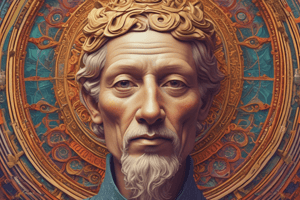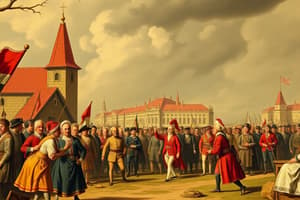Podcast
Questions and Answers
What was a significant factor that influenced the shift in thinking during the Enlightenment?
What was a significant factor that influenced the shift in thinking during the Enlightenment?
- Development of artistic techniques
- Focus on humanism from the Renaissance (correct)
- Reliance on religious teachings
- Emphasis on tradition and folklore
Which thinker is NOT mentioned as a revolutionary theorist of the Enlightenment?
Which thinker is NOT mentioned as a revolutionary theorist of the Enlightenment?
- Thomas Hobbes
- John Locke
- Isaac Newton
- Voltaire (correct)
What was the main focus of the Enlightenment compared to earlier beliefs?
What was the main focus of the Enlightenment compared to earlier beliefs?
- Development of artistic expressions
- Preservation of traditions and customs
- Exploration of human nature and reason (correct)
- Spiritual teachings and religious authority
During which time period did the Enlightenment approximately begin?
During which time period did the Enlightenment approximately begin?
Where did the Enlightenment have a particularly strong movement?
Where did the Enlightenment have a particularly strong movement?
Which of the following was a cause of the Enlightenment?
Which of the following was a cause of the Enlightenment?
What transformation in knowledge acquisition happened during the Enlightenment?
What transformation in knowledge acquisition happened during the Enlightenment?
What central theme from the Renaissance carried over into the Enlightenment?
What central theme from the Renaissance carried over into the Enlightenment?
What concept did Enlightenment thinkers like Locke and Rousseau advocate regarding the source of legitimate government?
What concept did Enlightenment thinkers like Locke and Rousseau advocate regarding the source of legitimate government?
How did Locke's idea of the tabula rasa influence Enlightenment thought?
How did Locke's idea of the tabula rasa influence Enlightenment thought?
Which of the following revolutions was inspired by the ideas of Enlightenment thinkers?
Which of the following revolutions was inspired by the ideas of Enlightenment thinkers?
In the debate between empiricists and rationalists during the Enlightenment, what did empiricists believe?
In the debate between empiricists and rationalists during the Enlightenment, what did empiricists believe?
What was a key difference between the social contract theories of Locke and Rousseau?
What was a key difference between the social contract theories of Locke and Rousseau?
What is a core belief of humanism regarding human nature?
What is a core belief of humanism regarding human nature?
Which period led to the rediscovery of ideas like humanism?
Which period led to the rediscovery of ideas like humanism?
What was a major consequence of the Protestant Reformation?
What was a major consequence of the Protestant Reformation?
Which branch of knowledge did the Scientific Revolution primarily focus on?
Which branch of knowledge did the Scientific Revolution primarily focus on?
Who is known for arguing that power derives from the people rather than the divine right of kings?
Who is known for arguing that power derives from the people rather than the divine right of kings?
What did Francis Bacon emphasize as essential for obtaining scientific knowledge?
What did Francis Bacon emphasize as essential for obtaining scientific knowledge?
What is deism?
What is deism?
Which political thinker is known for his belief in absolute monarchy?
Which political thinker is known for his belief in absolute monarchy?
The Encyclopedie was an effort to do what?
The Encyclopedie was an effort to do what?
How did John Locke's view of the social contract differ from that of Thomas Hobbes?
How did John Locke's view of the social contract differ from that of Thomas Hobbes?
What did Montesquieu argue about government?
What did Montesquieu argue about government?
What economic theory suggests that private business prosperity leads to state economic prosperity?
What economic theory suggests that private business prosperity leads to state economic prosperity?
What did Adam Smith advocate for in his book 'Wealth of Nations'?
What did Adam Smith advocate for in his book 'Wealth of Nations'?
Which revolution was significantly influenced by Enlightenment thinkers?
Which revolution was significantly influenced by Enlightenment thinkers?
What is one effect of the Enlightenment on society?
What is one effect of the Enlightenment on society?
How did the Enlightenment challenge traditional authorities?
How did the Enlightenment challenge traditional authorities?
Which event significantly contributed to the rise of modern capitalism?
Which event significantly contributed to the rise of modern capitalism?
What was a key characteristic of Hobbes' view of human life in the state of nature?
What was a key characteristic of Hobbes' view of human life in the state of nature?
What is the primary difference between capitalism and communism?
What is the primary difference between capitalism and communism?
How did Bacon suggest experiments should be designed?
How did Bacon suggest experiments should be designed?
Study Notes
The Enlightenment Overview
- A movement emphasizing reason, humanism, individualism, and skepticism, shifting focus from spiritual teachings to scientific understanding.
- Key thinkers included John Locke, Thomas Hobbes, and others who challenged traditional ideas about government and society.
Historical Context
- Began in the late 17th-century, lasting into the early 19th-century, following the Renaissance.
- Originated primarily in Europe, especially France, before spreading globally.
Causes of the Enlightenment
- Humanism: Focus on human nature and rational solutions to problems, promoting social justice and equality.
- Protestant Reformation: Martin Luther's challenge to Catholic Church practices, fostering independent thought.
- Scientific Revolution: An era of advancements in biological, astronomical, and physical sciences, laying the groundwork for modern science and rational thought.
Key Themes of the Enlightenment
- Humanism: Belief in the goodness of human nature and rational strategies for problem-solving without spiritual intervention.
- Rationalism vs. Empiricism: Controversial debate where rationalists emphasized innate knowledge versus empiricists who believed knowledge originated from sensory experience.
- Deism: Belief in a non-intervening creator who established the universe's laws; influential among Enlightenment thinkers.
Notable Figures
- John Locke: Advocate for social contract theory, believed government should protect human rights, termed "Father of Classical Liberalism."
- Thomas Hobbes: Supported absolute monarchy, viewed life in the state of nature as "nasty, brutish, and short."
- Montesquieu: Proposed separation of powers to prevent government corruption, foundational to modern democratic systems.
Impact of the Enlightenment
- Encouraged questioning of government authority, replacing divine rights with people-derived authority, leading to revolutions (e.g., American and French).
- Led to significant societal changes, such as modern medicine practices, public education, and democratic governance systems.
Epistemological Development
- John Locke introduced the concept of tabula rasa, stating humans are born with a blank slate and knowledge develops through experience.
- Debate on how knowledge is acquired—empiricism versus rationalism—shaped future philosophical and scientific methods.
Economic Theories Stemming from the Enlightenment
- Capitalism: Emerged as a system favoring minimal government intervention in economics, facilitating private enterprise and prosperity.
- Adam Smith: Key figure advocating for "laissez-faire" economics, viewed the market's "Invisible Hand" as self-regulating.
Notable Concepts
- Natural Law: The belief that the universe operates according to discernible principles, influencing societal structures and governance.
- Social Contract Theory: Concept established by Hobbes and Locke, explaining the mutual obligations between rulers and their subjects.
Summary
- The Enlightenment set the stage for modern political thought, emphasizing individual rights and reason over traditional authority. Its principles continue influencing contemporary democratic ideals and philosophies.
Studying That Suits You
Use AI to generate personalized quizzes and flashcards to suit your learning preferences.
Description
This quiz explores the Enlightenment and its impact on scientific thought, particularly regarding gravity. Learn about Sir Isaac Newton's contributions and how perceptions of natural phenomena evolved from religious teachings to empirical inquiry during this pivotal period in history.




